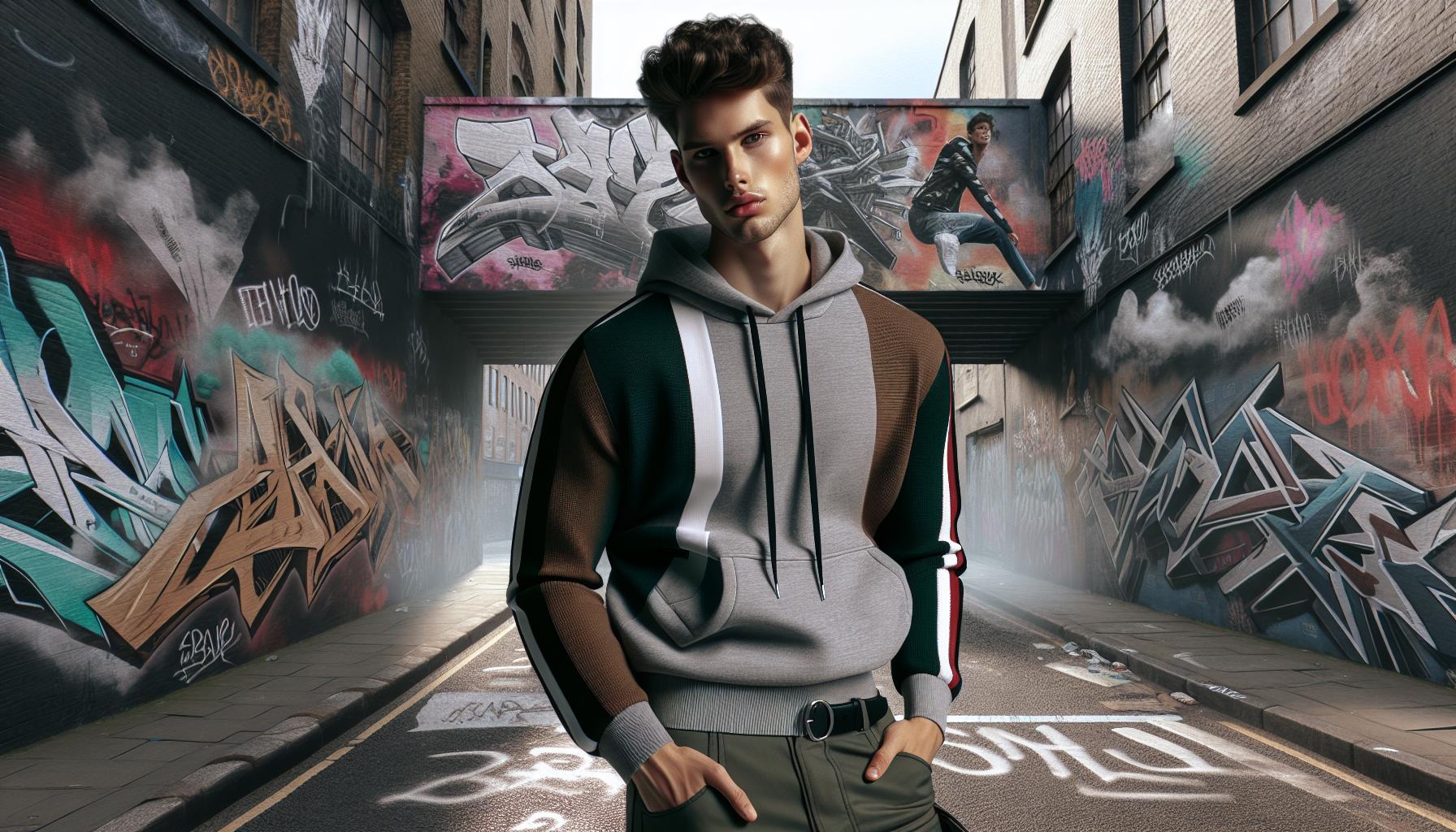In today’s fashion landscape, the term “fast fashion” often sparks heated debates. I’ve found myself questioning whether brands like Aelfric Eden fit into this category. Known for its trendy streetwear and eye-catching designs, Aelfric Eden has gained popularity among fashion enthusiasts. But does its rapid production and turnover of styles contribute to the fast fashion dilemma?
As I dive deeper into the ethos of Aelfric Eden, I can’t help but consider the implications of its business model. Are they prioritizing speed over sustainability? Or is there more to their approach that challenges the conventional fast fashion narrative? Join me as I explore the intricacies of Aelfric Eden and determine if it truly embodies the fast fashion label.
Key Takeaways
- Is aelfric eden fast fashion? Aelfric Eden is a streetwear brand that combines trendy designs with rapid production cycles, drawing parallels to fast fashion practices.
- The brand emphasizes limited-edition collections, creating a sense of exclusivity while raising concerns about sustainability and textile waste.
- Aelfric Eden’s pricing strategy balances affordability and perceived exclusivity, attracting a youthful demographic but reinforcing fast fashion consumption patterns.
- Consumer perception is mixed, with many appreciating the aesthetic while questioning the brand’s sustainability claims and ethical sourcing.
- The brand’s reliance on social media and influencer marketing plays a significant role in shaping its visibility and consumer perceptions, both positively and negatively.
- As awareness of environmental issues grows, Aelfric Eden may face increasing pressure to adopt more sustainable practices to maintain consumer trust and loyalty.
Is Aelfric Eden Fast Fashion
Aelfric Eden operates within the streetwear segment, targeting a youthful demographic. Founded in 2019, the brand emphasizes contemporary designs and vibrant graphics, appealing to fashion-forward consumers. Aelfric Eden’s collections showcase bold patterns, oversized silhouettes, and unique detailing, providing a fresh take on urban attire.
Aelfric Eden emphasizes limited-edition releases, fostering exclusivity and urgency among shoppers. Its production process features quick turnaround times, meaning new styles frequently appear. This rapid production aligns with the fast fashion model, raising questions about sustainability practices.
The brand’s online presence strengthens its reach, with marketing strategies that leverage social media platforms. Engagement through influencer collaborations amplifies brand visibility, making it a recognizable name in streetwear.
Aelfric Eden’s approach presents both opportunities and challenges. While the brand capitalizes on fast fashion’s allure, concerns about environmental impact arise. The balance between trend-driven designs and sustainable practices continues to be a critical topic within the broader fashion discourse.
Characteristics of Fast Fashion

Fast fashion represents a model of rapid production and consumption in the clothing industry. This approach prioritizes quick turnaround times and constant trend updates, which significantly impact the environment and society.
Definition of Fast Fashion
Fast fashion describes inexpensive clothing produced rapidly by mass-market retailers in response to the latest trends. It relies on a cycle of buying new garments frequently, discarding them quickly, and creating a strong demand for new styles. This business model accelerates trends, leading to an endless pursuit of novelty in fashion.
- Rapid Production Cycles: Fast fashion brands can design, manufacture, and distribute new collections within weeks.
- Low Prices: Reducing costs is essential, allowing consumers access to trendy clothing at affordable prices.
- High Volume of Products: Fast fashion brands release numerous collections each season to maintain consumer interest and sales growth.
- Emphasis on Trends: These brands focus primarily on current fashion trends, ensuring designs quickly reflect what’s popular.
- Disposable Culture: The market encourages consumers to frequently replace garments, contributing to textile waste.
- Global Supply Chains: Fast fashion brands often utilize international manufacturing to minimize production costs and time, sometimes sacrificing labor standards for savings.
- Aggressive Marketing Strategies: Brands invest heavily in advertising and influencer collaborations to quickly generate buzz around new collections.
These characteristics illustrate how fast fashion operates and the challenges it presents in terms of sustainability and ethical practices.
Analysis of Aelfric Eden’s Practices

Aelfric Eden’s practices require examination to determine if they align with fast fashion principles. The brand’s production methods, sustainability efforts, and pricing strategy significantly impact its classification in the fashion industry.
Production Methods
Aelfric Eden employs rapid production methods to meet fast-paced trends. The brand maintains a streamlined supply chain that enables quick design-to-retail cycles. By collaborating with global manufacturers, it ensures efficient production and effective inventory management. Limited-edition collections reflect this approach, resulting in shorter lead times yet raising concerns regarding labor practices. Transparency in sourcing remains critical to assessing ethical implications within its production framework.
Sustainability Efforts
Aelfric Eden’s sustainability efforts demonstrate a mixed commitment to environmental concerns. While the brand promotes limited runs and exclusive pieces, often touted as sustainable practices, its frequent trend turnover invites scrutiny. The use of synthetic materials in some collections raises questions regarding textile waste and biodegradability. Aelfric Eden has made strides in increasing awareness of sustainability, yet proactive measures—such as adopting eco-friendly fabrics or improving manufacturing processes—could further solidify its stance within the eco-conscious market.
Pricing Strategy
Aelfric Eden’s pricing strategy reflects a combination of affordability and exclusivity aimed at its target demographic. Products are priced competitively to attract a younger audience, balancing perceived value with brand positioning. However, low price points alongside rapid trend cycles often correlate with fast fashion attributes. While affordable, the pricing model contributes to consumption patterns that challenge sustainability. Adopting a more transparent pricing strategy tailored to promote slower consumption could align Aelfric Eden more closely with sustainable fashion initiatives.
Comparison with Traditional Fast Fashion

Aelfric Eden exhibits similarities and differences when compared to traditional fast fashion brands.
- Production Speed: Aelfric Eden maintains a rapid production pace, aligning closely with fast fashion’s ethos of quick turnaround times. Traditional fast fashion brands like Zara or H&M also prioritize speed, often introducing new collections weekly.
- Trend Adoption: Aelfric Eden focuses on trendy streetwear, appealing to contemporary tastes. Similarly, traditional fast fashion brands capitalize on current trends, often mimicking high-fashion designs to attract consumers.
- Sustainability Practices: Aelfric Eden’s sustainability efforts, including limited-edition releases, create a contrast with traditional fast fashion’s mass-production model. Traditional brands typically produce high volumes, resulting in significant environmental impact and waste.
- Pricing Strategy: Aelfric Eden offers prices that balance affordability and exclusivity, attracting a youthful demographic. Many traditional fast fashion brands also use low pricing to encourage impulse buying, contributing to a throwaway culture.
- Marketing Approach: Aelfric Eden leverages social media and influencer collaborations to promote its brand. Traditional fast fashion brands rely on aggressive marketing strategies to keep consumers engaged, maintaining cyclical demand for new products.
This comparison highlights crucial considerations regarding Aelfric Eden’s practices, prompting further reflection on its place within the fast fashion landscape. Analyzing these aspects illustrates the brand’s relationship to both sustainable fashion ideals and traditional fast fashion principles.
Consumer Perception of Aelfric Eden
Consumer perception of Aelfric Eden varies widely, influenced by the brand’s trendy designs and sustainable claims. Many consumers appreciate the streetwear aesthetic, gravitating toward limited-edition pieces that emphasize individuality while aligning with current fashion trends. This demographic, primarily younger shoppers, values exclusivity and seeks unique items that stand out in a crowded market.
Concerns about sustainability and ethical sourcing persist among consumers. I often encounter discussions regarding the environmental implications of frequent clothing turnover. Ethical consumers question how limited releases can offset the potential waste generated through rapid trend cycles. Transparency in production practices weighs heavily on consumer sentiment, with many shoppers emphasizing the importance of knowing where and how their clothes are made.
Social media plays a prominent role in shaping perceptions. Influencer collaborations boost Aelfric Eden’s visibility, creating a buzz that both attracts and alienates customers. While some consumers perceive these campaigns as innovative and engaging, others view them as a tactic typical of fast fashion brands, heightening skepticism about the brand’s commitment to sustainability.
User reviews also reflect mixed feelings. Many praise the quality and aesthetic of Aelfric Eden’s products, while others express disappointment over issues like sizing inconsistencies and customer service experiences. These reviews significantly influence purchasing decisions and shape overall brand reputation.
The balance between affordability and exclusivity impacts consumer choices. Price points positioned as accessible yet premium attract buyers looking for value. However, this strategy raises questions about the long-term sustainability of consumption patterns among fashion-forward consumers, who may gravitate toward fast fashion offerings instead.
Overall, consumer perception of Aelfric Eden encapsulates a complex interplay of desirability, ethical concerns, and market positioning. As awareness of fashion’s environmental impact grows, I anticipate increased scrutiny of brands like Aelfric Eden, pushing them to align more closely with sustainable practices in the eyes of their consumers.
Conclusion
Is aelfric eden fast fashion? Aelfric Eden’s approach to fashion certainly raises important questions about its alignment with fast fashion principles. While the brand offers trendy designs and limited-edition releases that appeal to a youthful audience, its rapid production cycle and reliance on global supply chains echo traditional fast fashion practices.
I can’t ignore the mixed reviews regarding sustainability and ethical sourcing. As consumers become more aware of the environmental impact of their choices, brands like Aelfric Eden will need to navigate the delicate balance between trendiness and responsibility. The ongoing conversation about sustainability in fashion will undoubtedly influence Aelfric Eden’s future direction and consumer perception.



